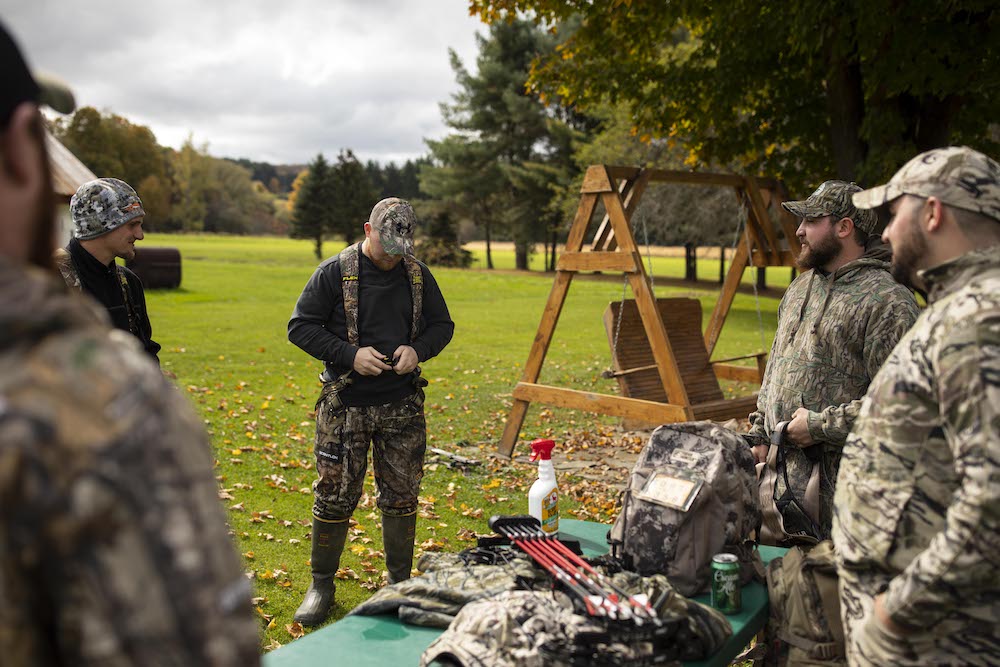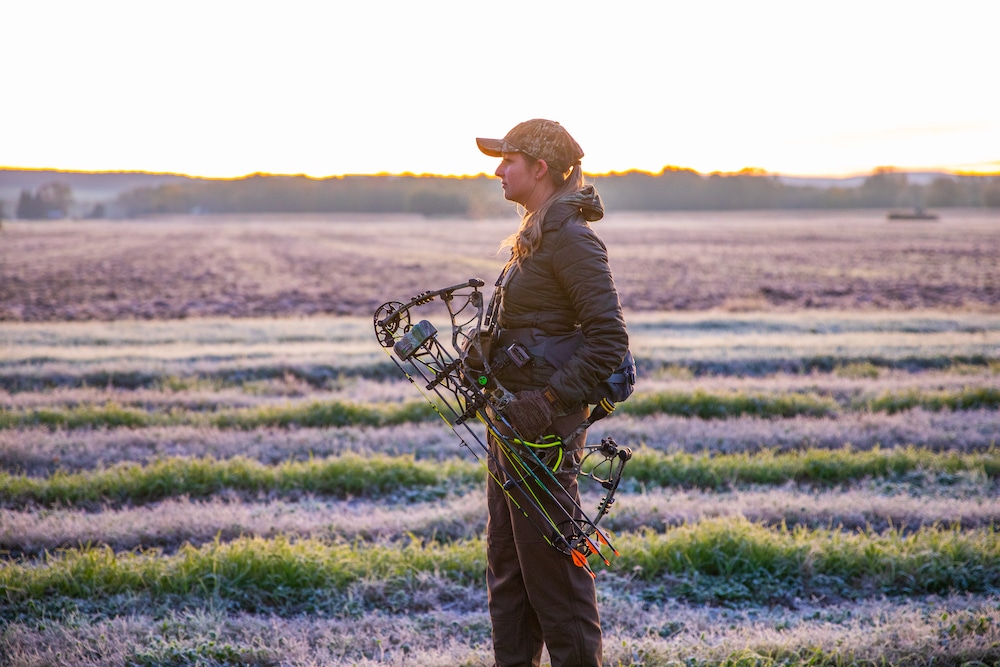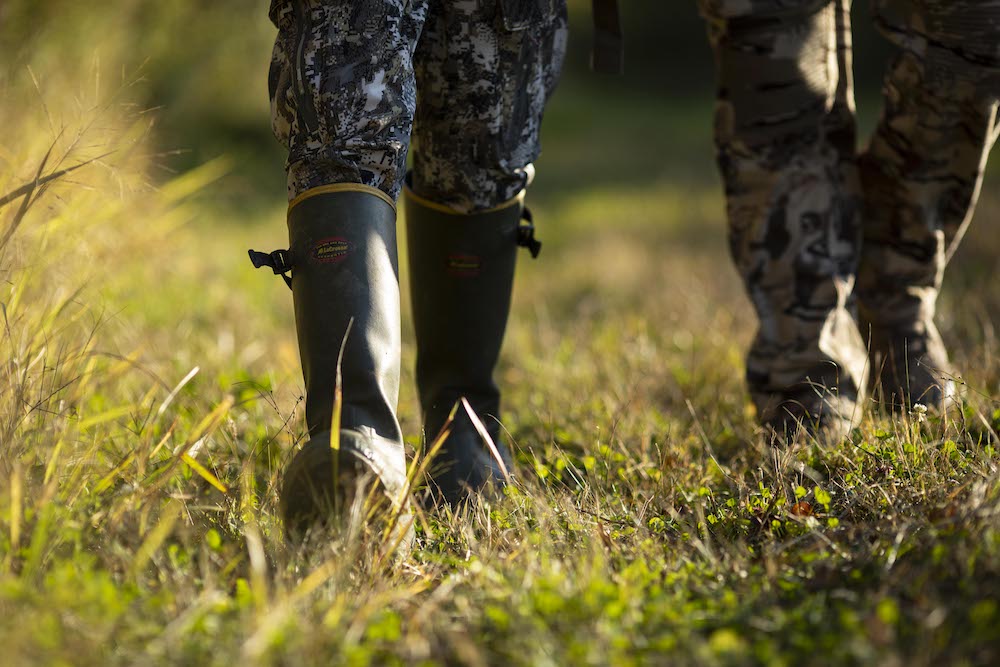All your efforts planting food plots, running trail cameras and practicing with your bow are for naught if you’re not sitting in your stand when your target buck shows up because you were cold. Some of the best hunting each year — including the rut and post-rut — happens during cold weather. Dressing properly to stay warm can help you endure those long hours on stand during cold days with relative comfort.
You’ve heard it before, but dressing in layers is the key to staying warm. The layered approach allows you to add or remove garments as needed so you don’t get cold or overheated, but each layer also serves a specific purpose.
The layer in contact with your skin should wick moisture. Getting wet or sweaty is a sure way to get cold. Wear long underwear and socks made of moisture-wicking fabrics like polypropylene, polyester or merino wool. These materials may cost a little more than Grandpa’s cotton long johns, but they do a good job of transferring water away from your skin, and the warmth they provide are well worth the added cost.

Wear a layer of fleece next. Photo Credit: ATA
This one should be an insulating layer that traps air warmed by your body heat. Fleece is an excellent material for mid-layer garments. It’s soft, quiet and not bulky. Down is another good choice for a mid-layer. It has fantastic insulating qualities so long as it’s kept dry. The drawback is that it’s a bit bulky, and not very moisture resistant.

Choose a waterproof material for the outer layer. Photo Credit: ATA
Your outer layer’s job is to protect you from wind, rain or snow. Materials like Gore-Tex have a tight weave that keeps rain and snow out, but tiny sweat molecules can still escape from the inside. Ideally, bowhunters want an outer layer that’s quiet, and so you have to beware of some waterproof options that have a noisy outer shell, like a traditional rain jacket. A warm, fleece-lined outer layer with a waterproof, breathable membrane to resist the elements will serve you well.

Wear proper boots to navigate the terrain. Photo Credit: ATA
Don’t forget your hands and feet, since they are the first parts of your body to get cold. Your boots should be insulated and large enough to accommodate both a wicking and an insulating pair of socks (make sure you consider this when picking out your boots. You may have to order them a half-size larger than usual). If your boots are too small, they pinch off circulation in your feet, which makes your feet cold. Feet also tend to sweat a lot, and so you may want to wear a different pair of boots on the way to your stand. Knee-high rubber boots can help you navigate swampy areas or creeks, while keeping your scent down. Once you’re at your stand, you can change into your insulated pack boots to keep your feet warm.
Keeping your hands warm is critical so you can make a shot when it presents itself. Fingerless gloves or mittens that fold open to expose your fingers give you dexterity. Wearing a muff around your waist is another good way to keep fingers warm while in your stand, but it won’t help much while you’re walking to and from your stand. Don’t forget about chemical hand and toe warmers. These cheap products are designed to slip into boots or mittens and will provide heat for hours.

Wear a warm hat. Photo Credit: ATA
You lose 50% of your body heat through your head. A stocking hat, rather than a baseball cap, gets the nod for hunting in cold weather. In extreme conditions, consider a face mask or balaclava, but be warned that these could alter your anchor point and impact your shooting. Practice shooting while wearing them before your hunt.
Some people are more susceptible to cold than others. You know your body better than anyone. If you’re the type of person who is chronically cold, you may want some type of extreme cold-weather hunting suit, such as the Heater Body Suit or the Blizzard Buddy Hunting Suit. These products are quiet and designed for extreme warmth. They slip off or open when it’s time to shoot.
Remember, one key to staying warm is to keep from breaking into a sweat. Carry your outer (and maybe even your middle) layer in a backpack while walking to your stand. Allow yourself extra time during your walk to stop and take a breather so you don’t start sweating. Once you start sweating, your chances of staying warm on stand are greatly diminished.
Being able to sit in your stand is great, but when it comes to the moment of truth, you need to be able to execute your shot, and that requires movement. Practice shooting your bow in all your cold-weather gear. Consider having a friend listen to your movements with his back turned to verify that you can do so quietly. If not, you may need to change clothing materials. Another consideration is getting busted by your quarry while wearing all this garb. When hunting especially cold days, you may want to switch to a ground blind to help conceal your movements with the added bulk.